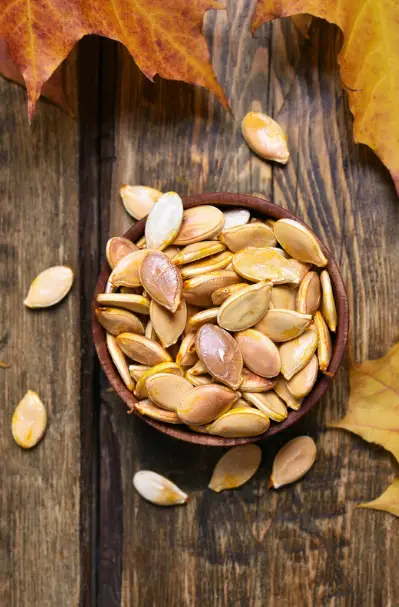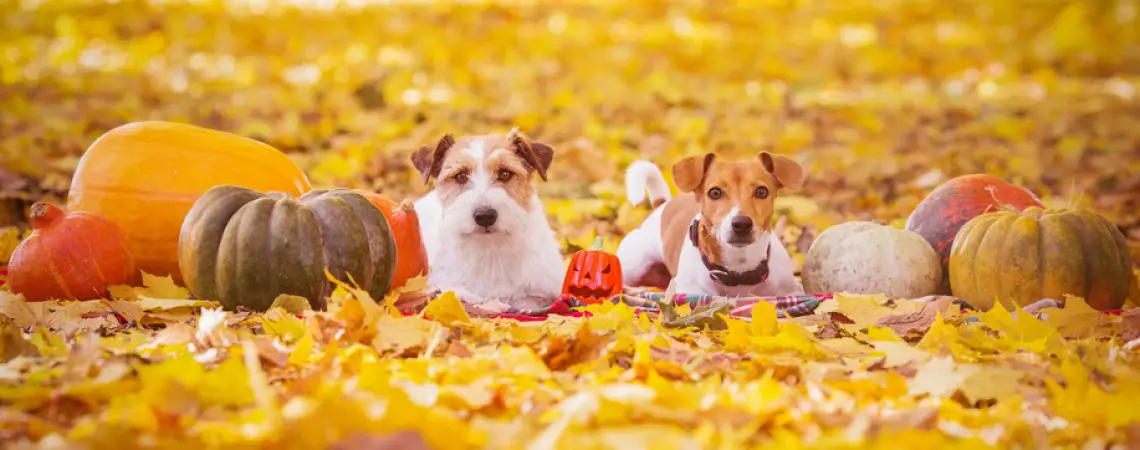In today’s article, we’re going to be talking about pumpkin seeds!
It’s pretty well known that pumpkin is great for dogs, but what about the seeds? Is it safe for them to eat those?
Can dogs eat pumpkin seeds?
YES! The good news is that pumpkin seeds are great for dogs. The bad news is that it will require a little preparation on your part, because the best way to give your dog pumpkin seeds is to roast them in the oven and then grind them up. This makes it easier to sprinkle them into your dog’s food so that they get all the benefits of the pumpkin seeds. (Keep reading for instructions)
How to feed pumpkin seeds to your dog
While some people do feed their dogs whole, raw seeds, this may not be the best method.
If you’re trying to feed your dog pumpkin seeds for the health benefits and not just because they like them, then it’ll be easier to get them to eat them this way.
Make sure you do not buy seeds that have any additives like salt for your dog!
- Preheat your oven to 300 degrees
- Start out by cleaning the seeds and pulling the pumpkin “meat” away from them
- Rinse the seeds, and then pat them dry with a paper towel
- Next, spread your seeds out evenly on a cookie sheet
- Bake them for 10-15 minutes
- Wait for them to cool, and then grind them up. A coffee grinder works well for this if you’ve got one!
- Sprinkle the seeds on to your dog’s food

How many pumpkin seeds should I give my dog?
Generally, feeding them 1 seed per 10 pounds of body weight is enough. You don’t need to over do it, and by roasting the seeds, you extend their shelf life. So, you can keep the bag for a long time.
The benefits of pumpkin seeds for dogs
Pumpkin seeds are just a great, healthy snack. They also come with some awesome health benefits for your pooch.
Pumpkin seeds are a natural dewormer
For starters, pumpkin seeds are a fantastic natural dewormer! Pumpkin seeds contain an amino acid called cucurbitin. This paralyzes and eliminates worms in the digestive tract! This can help you to prevent your dog from picking up tapeworms or roundworms.
Great for skin and coat
Pumpkin seeds are high in Omega 3 fatty acids. This makes them a great addition to help preserve your dog’s skin and coat! This is good news for allergy sufferers, because it can help dogs shed less. Even if you have a low shedding dog breed, they still shed, unfortunately. However, by adopting a good grooming routine and feeding them a quality diet that targets skin and coat health, you can reduce dander and fur loss.
Fiber content aids digestion
If your pup frequently has an upset stomach, constipation, or diarrhea, then pumpkin seeds can help them. For these dogs, additional fiber, like what’s contained in pumpkin seeds, can be beneficial for digestive regulation. However, canned pumpkin is better for this one.
High in antioxidants
Pumpkin seeds are also high in antioxidants. These can help to improve urinary tract health and many other benefits. It can even help to avoid kidney stones!
Helps fight inflammation
We already talked about how Omega 3 fatty acids are great for your dog’s skin and coat, but they have another benefit as well. They can also help to fight inflammation. This is particularly useful for older dogs, who frequently suffer from arthritis pain, which is related to inflammation.
In short, not only can dogs eat pumpkin seeds, but they’re one of the healthiest things to feed them! The benefits of this “canine super food” goes on and on, and it’s one of the few human foods you don’t have to feel guilty about sharing with them.
Just keep in mind that pumpkin seeds do spoil rather quickly. Roasting them helps to keep them good longer, but make sure that you’re using them within a month or two. If the seeds are getting towards their “expiration date”, you can usually tell if they’re good by smell. Pumpkin seeds that smell like they’re rancid, or even stale should be discarded.
We’ve also done a few more articles on doggy diets which you may be interested. Including one on turkey necks and one on jelly!





